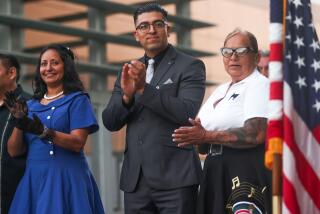The Changing Political Scene
- Share via
The recent election of Cuban-born Xavier Suarez, 36, as mayor of Miami is another milestone in the evolution of American politics, the broadening of the governing process to include racial and ethnic minorities and women. At the same time, Kathryn Whitmore won a second term as mayor of Houston. And Los Angeles finally is on the threshold of Latino participation in the higher levels of city government with the expected election of a City Council member.
More and more the executive offices of America’s city halls are becoming reflective of the diversity of the cities’ populations and that of the nation, since we are basically an urban society. The first black mayors of major U.S. cities were elected in 1967: Carl B. Stokes of Cleveland and Richard G. Hatcher of Gary, Ind. (who still is mayor of Gary). Today blacks, Latinos and woman hold mayorships of six of the nation’s 10 most populous cities.
Increasingly these mayors have enjoyed success not just through the support of the minorities with which they are identified but through broad coalitions. In Miami, where a Puerto Rican has been mayor, there was concern that the election of a Cuban-born chief executive might heighten ethnic and racial tensions. But one of Suarez’ first statements on election night was a pledge to work for improvement of life for black people in Miami’s poorest areas.
A mayor’s job often has been a dead end politically, however. Minorities and women therefore have had a much tougher time of cracking the upper echelons of politics--governor, congressman, senator and, until Geraldine Ferraro, the national tickets of President and vice president. There has been only one black U.S. senator in modern times, and the 435-member House has just 20 blacks. There are two women in the 100-member Senate, 23 in the House and two in governorships.
For the first time in 1984, a black, Jesse Jackson, made a serious attempt at a major party presidential nomination. Jackson’s achievement was remarkable, given his lack of resources. His delegate count would have been even more substantial had Democratic Party rules not mitigated against long-shot candidacies.
Los Angeles Mayor Tom Bradley narrowly lost a bid for the California governorship in 1982, but will probably make another attempt. Norman Mineta, the first Japanese-American mayor of a large city (San Jose), is enjoying a successful career in the House. Other mayors such as Henry Cisneros of San Antonio, Federico Pena of Denver and W. Wilson Goode of Philadelphia are among the growing number of young, attractive potential candidates for major office in the future.
The United States has conquered its last physical frontiers, but an exciting new manifest destiny lies ahead: the tapping of a vast reservoir of political leadership and talent that can help rejuvenate the American spirit and instill a new sense of trust and pride in republican government.
More to Read
Get the L.A. Times Politics newsletter
Deeply reported insights into legislation, politics and policy from Sacramento, Washington and beyond. In your inbox twice per week.
You may occasionally receive promotional content from the Los Angeles Times.










